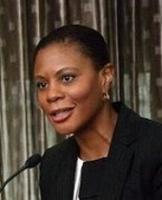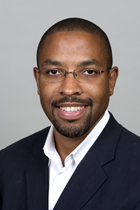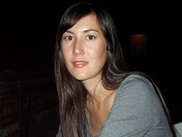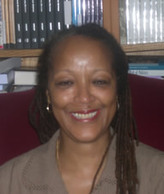Science, Publics, and the Politics of Knowledge: The Renaturalization of Race in the Genomic Age
October 21, 2010, 4pm Cogut Center for the Humanities 3rd Floor

ALONDRA NELSON Sociology and the Institute for Research on Women and Gender, Columbia University
Alondra Nelson is Associate Professor of Sociology and holds an appointment in the Institute for Research on Women and Gender (IRWaG). Her areas of specialization include race and ethnicity in the U.S.; gender and kinship; socio-historical studies of medicine, science and technology; and social and cultural theory. Nelson studies the production of knowledge about human difference in biomedicine and technoscience and the circulation of these ideas in the public sphere: Her research focuses on how science and its applications shape the social world, including aspects of personal identification, racial formation and collective action. In turn, she also explores the ways in which social groups challenge, engage and, in some instances, adopt and mobilize conceptualizations of race, ethnicity and gender derived from scientific and technical domains.
Alondra Nelson is Associate Professor of Sociology and holds an appointment in the Institute for Research on Women and Gender (IRWaG). Her areas of specialization include race and ethnicity in the U.S.; gender and kinship; socio-historical studies of medicine, science and technology; and social and cultural theory. Nelson studies the production of knowledge about human difference in biomedicine and technoscience and the circulation of these ideas in the public sphere: Her research focuses on how science and its applications shape the social world, including aspects of personal identification, racial formation and collective action. In turn, she also explores the ways in which social groups challenge, engage and, in some instances, adopt and mobilize conceptualizations of race, ethnicity and gender derived from scientific and technical domains.

COREY WALKER Africana Studies and Science and Technology Studies, Brown University
Corey D. B. Walker (Ph.D., The College of William and Mary, 2001) is Associate Professor in the Department of Africana Studies where he teaches undergraduate and graduate courses in philosophy, modern theology, and critical theory. His research revolves around a series of critical investigations into the historical, philosophical, and theological problems of modern thought and political practice. He is a Faculty Affiliate in the Department of Religious Studies, the Center for Latin American and Caribbean Studies, the Center for the Study of Race and Ethnicity in America, and the Committee on Science and Technology Studies. Professor Walker also serves as an Associate Editor of The Journal of the American Academy of Religion, the top academic journal for the study of religion.
Corey D. B. Walker (Ph.D., The College of William and Mary, 2001) is Associate Professor in the Department of Africana Studies where he teaches undergraduate and graduate courses in philosophy, modern theology, and critical theory. His research revolves around a series of critical investigations into the historical, philosophical, and theological problems of modern thought and political practice. He is a Faculty Affiliate in the Department of Religious Studies, the Center for Latin American and Caribbean Studies, the Center for the Study of Race and Ethnicity in America, and the Committee on Science and Technology Studies. Professor Walker also serves as an Associate Editor of The Journal of the American Academy of Religion, the top academic journal for the study of religion.

LUNDY BRAUN Africana Studies and Science and Technology Studies, Brown University
Lundy Braun (Ph.D. 1982, Johns Hopkins University School of Hygiene and Public Health) is a Professor of Africana Studies and Pathology and Laboratory Medicine and a member of the Science and Technology Studies Program at Brown. Her current research focuses on: 1) the history of global exchanges of knowledge about race, science, and medical technologies in the 19th and 20th centuries; 2) the socio-political and economic production of invisibility of asbestos-related diseases in South Africa; and 3) the contemporary debate over race, genomics, and health inequality. She has participated in national and international workshops on race, genetics, and health. She is currently working on a monograph, Racialization of Lung Capacity Measurements: A History of Spirometry, 1840 to the Present, that explores how race became attached and embedded in this widely used technology for measuring lung function.
Lundy Braun (Ph.D. 1982, Johns Hopkins University School of Hygiene and Public Health) is a Professor of Africana Studies and Pathology and Laboratory Medicine and a member of the Science and Technology Studies Program at Brown. Her current research focuses on: 1) the history of global exchanges of knowledge about race, science, and medical technologies in the 19th and 20th centuries; 2) the socio-political and economic production of invisibility of asbestos-related diseases in South Africa; and 3) the contemporary debate over race, genomics, and health inequality. She has participated in national and international workshops on race, genetics, and health. She is currently working on a monograph, Racialization of Lung Capacity Measurements: A History of Spirometry, 1840 to the Present, that explores how race became attached and embedded in this widely used technology for measuring lung function.

CATHERINE BLISS Africana Studies and Science and Technology Studies, Brown University
Catherine Bliss is Brown University's Andrew W. Mellon Postdoctoral Fellow in the Humanities and Social Sciences in the Department of Africana Studies and Science and Technology Studies. Her research examines the construction and naturalization of racial and ethnic categories in modern science, with a focus on biomedicine. Catherine's interests include health movements and controversies, emergent science, and racial identity. She is the author of The New Science of Race: Values, Consensus, and Practice in Genomics (forthcoming 2011, Stanford University Press).
Catherine Bliss is Brown University's Andrew W. Mellon Postdoctoral Fellow in the Humanities and Social Sciences in the Department of Africana Studies and Science and Technology Studies. Her research examines the construction and naturalization of racial and ethnic categories in modern science, with a focus on biomedicine. Catherine's interests include health movements and controversies, emergent science, and racial identity. She is the author of The New Science of Race: Values, Consensus, and Practice in Genomics (forthcoming 2011, Stanford University Press).

Moderator: GERI AUGUSTO Watson Institute for International Studies, Public Policy, and Science and Technology Studies, Brown University
Geri Augusto is an Adjunct Assistant Professor of Public Policy at Brown University. Her primary current interest is knowledge dynamics in complex interactive systems marked by power inequalities. This includes social and cultural interaction between contemporary indigenous African therapeutic knowledge and the biosciences, between local and global science, between historically black and historically white universities, and between lay and expert systems in many arenas. Other interests include the design and management of learning networks and systems of innovation, organizational learning and transformation, and practitioners’ knowledge.
Geri Augusto is an Adjunct Assistant Professor of Public Policy at Brown University. Her primary current interest is knowledge dynamics in complex interactive systems marked by power inequalities. This includes social and cultural interaction between contemporary indigenous African therapeutic knowledge and the biosciences, between local and global science, between historically black and historically white universities, and between lay and expert systems in many arenas. Other interests include the design and management of learning networks and systems of innovation, organizational learning and transformation, and practitioners’ knowledge.
